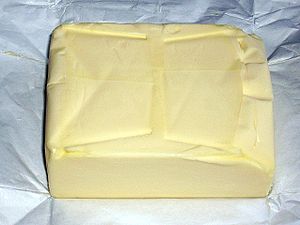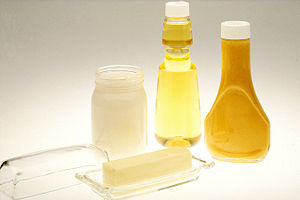Fats in diet
Fats ( lipids ), composed of fatty acids in the form of triacylglycerols and phospholipids and free or esterified cholesterol , should cover 28-30% of the energy intake received.
Function[edit | edit source]
Fats are the most abundant source of energy. They have about 2 times higher energy value compared to carbohydrates. In excess, they are stored in the subcutaneous tissue and act as a thermal insulator. They are also carriers of fat- soluble vitamins and a source of unsaturated fatty acids.
Cholesterol is essential for the construction of cell membranes - especially in the growing organism. It is also used to produce steroid hormones , sex hormones and bile acids. However, dietary cholesterol is not essential nor beneficial. Compound fats ( phospholipids , lipoproteins ) are used in the structure of tissues and various specific functions of the organism.
Surplus/Excess[edit | edit source]
Excessive dietary fat intake causes:
- Increased fat storage and consequent obesity .
- Increased risk of incidence of some cancers ( colorectal cancer , breast cancer , prostate cancer ).
- Immunosuppression.
- It is involved in the hormonal imbalance of the body.
- Increased cholesterol intake is involved in hypercholesterolemia and the subsequent development of atherosclerosis , coronary heart disease and chronic coronary heart disease .
- Fat-containing foods provide suitable conditions for the production of mycotoxins and for the accumulation of lipophilic foreign toxic substances from the environment (PCBs, chlorinated pesticides, aflatoxins, polycyclic aromatic hydrocarbons, etc.).
- Double bonds of unsaturated fatty acids are prone to oxidative changes that lead to peroxidation of cell membrane lipids and exposure of the body to oxidative stress . Therefore, a sufficient supply of antioxidant substances (vitamin C, E, A, β-carotene and other plant antioxidants) is necessary.
Shortage or lack of dietary fats[edit | edit source]
Lack of fat results in insufficient absorption of fat-soluble vitamins (vitamin A, D, E and K).
Links[edit | edit source]
Related articles[edit | edit source]
- Lipids
- Types of food
- carbohydrates in the diet
- Proteins in diet
- Minerals in food
- Trace elements in food
- Microorganisms in food
- Contaminants in food
- Nutrition recommendations
- Vitamins
References[edit | edit source]
- BENCKO, Vladimír. Hygiena – učební texty k seminářům a praktickým cvičením. 2. edition. Univerzita Karlova, 2002. 204 pp. ISBN 80-7184-551-5.


